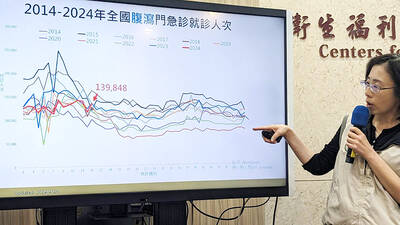Taipei Veterans General Hospital yesterday said that an elderly woman with a severe case of COVID-19 had been successfully treated with a biological agent normally used for rheumatoid arthritis.
Division of Allergy, Immunology and Rheumatology director Tsai Chang-youh (蔡長祐) said that the woman, who was in a critical condition, had been transferred to the hospital in March.
The patient had difficulty breathing and serious pulmonary edema, so she was put on a ventilator and given extracorporeal membrane oxygenation (ECMO), Tsai said.
In a chest radiograph her lungs were completely whited out, which meant her condition was life-threatening, he said.
After discussing her case in several meetings and gaining the hospital’s approval, his medical team administered an interleukin-6 (IL-6) inhibitor to fight a cytokine storm that was causing the edema.
A cytokine storm is a severe immune reaction in which excessive amounts of pro-inflammatory molecules are produced. This flood of molecules attacks cells and tissue rather than just fighting off a virus.
People with COVID-19 sometimes have the same condition as people with rheumatic autoimmune diseases, in which the immune system mistakenly attacks healthy cells, causing inflammation throughout the body, Tsai said.
Liao Hsieh-tsung (廖顯宗), an attending physician in the division, said that the woman was given antibiotics and vasopressor agents for more than two weeks, but her condition did not improve much.
The team discussed whether her cardiopulmonary function and blood pressure were being affected by the cytokine storm and what alternatives might be more effective, Liao said, adding that they believed the IL-6 inhibitor would likely be the most effective treatment.
A day after administering the inhibitor, a chest radiograph showed that her lungs had improved significantly, Liao said, adding that she was taken off the ventilator and ECMO less than three weeks later.
Pneumonia caused by COVID-19 or other factors can lead to increased levels of cytokines, including IL-6, and the lung condition can be improved if IL-6 is inhibited, Tsai said, adding that when they made the decision to administer the inhibitor, they had not heard of other countries using the same method to treat people with COVID-19 in a similar condition.
Inflammation is often the cause of death in patients with viral infections, he said, adding that the IL-6 inhibitor controlled the inflammation, but did not fight the virus itself.
The inhibitor is covered by the National Health Insurance when prescribed to people with rheumatoid arthritis and it must be approved as a special case, Tsai said.
The Central Epidemic Command Center has included the drug in its Interim Guidelines for Clinical Management of SARS-CoV-2 Infection, Tsai said.

FLU SEASON: Twenty-six severe cases were reported from Tuesday last week to Monday, including a seven-year-old girl diagnosed with influenza-associated encephalopathy Nearly 140,000 people sought medical assistance for diarrhea last week, the Centers for Disease Control (CDC) said on Tuesday. From April 7 to Saturday last week, 139,848 people sought medical help for diarrhea-related illness, a 15.7 percent increase from last week’s 120,868 reports, CDC Epidemic Intelligence Center Deputy Director Lee Chia-lin (李佳琳) said. The number of people who reported diarrhea-related illness last week was the fourth highest in the same time period over the past decade, Lee said. Over the past four weeks, 203 mass illness cases had been reported, nearly four times higher than the 54 cases documented in the same period

A group of Taiwanese-American and Tibetan-American students at Harvard University on Saturday disrupted Chinese Ambassador to the US Xie Feng’s (謝鋒) speech at the school, accusing him of being responsible for numerous human rights violations. Four students — two Taiwanese Americans and two from Tibet — held up banners inside a conference hall where Xie was delivering a speech at the opening ceremony of the Harvard Kennedy School China Conference 2024. In a video clip provided by the Coalition of Students Resisting the CCP (Chinese Communist Party), Taiwanese-American Cosette Wu (吳亭樺) and Tibetan-American Tsering Yangchen are seen holding banners that together read:

Heat advisories were in effect for nine administrative regions yesterday afternoon as warm southwesterly winds pushed temperatures above 38°C in parts of southern Taiwan, the Central Weather Administration (CWA) said. As of 3:30pm yesterday, Tainan’s Yujing District (玉井) had recorded the day’s highest temperature of 39.7°C, though the measurement will not be included in Taiwan’s official heat records since Yujing is an automatic rather than manually operated weather station, the CWA said. Highs recorded in other areas were 38.7°C in Kaohsiung’s Neimen District (內門), 38.2°C in Chiayi City and 38.1°C in Pingtung’s Sandimen Township (三地門), CWA data showed. The spell of scorching

UNAWARE: Many people sit for long hours every day and eat unhealthy foods, putting them at greater risk of developing one of the ‘three highs,’ an expert said More than 30 percent of adults aged 40 or older who underwent a government-funded health exam were unaware they had at least one of the “three highs” — high blood pressure, high blood lipids or high blood sugar, the Health Promotion Administration (HPA) said yesterday. Among adults aged 40 or older who said they did not have any of the “three highs” before taking the health exam, more than 30 percent were found to have at least one of them, Adult Preventive Health Examination Service data from 2022 showed. People with long-term medical conditions such as hypertension or diabetes usually do not